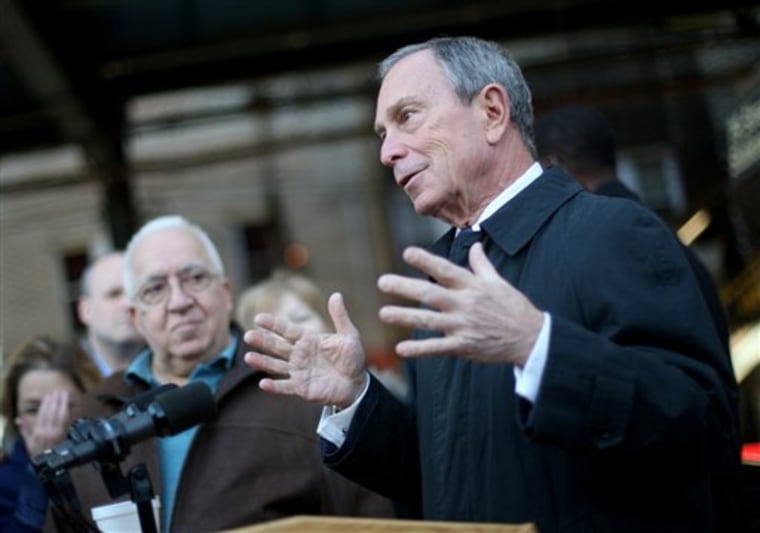Democrats who saw how close their candidate came to unseating New York Mayor Michael Bloomberg agonized Wednesday about what might have happened if the national party had not abandoned the party's little-known challenger.
Bloomberg, who was running on the Republican line but is not in a party, outspent and outcampaigned city Comptroller William Thompson Jr. Still, Thompson managed to get within five points of the billionaire incumbent despite getting no help from the Democratic National Committee or the party's leaders, who stayed silent about the race for City Hall in the nation's largest city.
"It's fair to say some people are soul-searching today, some of the folks who didn't get involved," said Public Advocate-elect Bill de Blasio, a Thompson supporter who will be the city's highest ranking Democrat when he is sworn into office in January.
Obama never campaigned with Thompson
President Barack Obama campaigned hard for his party in the New Jersey governor's race, where Democrats lost, and in an upstate New York congressional district, where they won. But he never campaigned with Thompson.
"You have to wonder if maybe they made one fewer trip, if one of the trips they did to New Jersey, whether they went to New York instead, it might have helped," said U.S. Rep. Anthony Weiner, a Democrat who had planned to run for mayor but dropped out because Bloomberg seemed unbeatable.
The president's tepid endorsement of Thompson didn't even come from his mouth. It was delivered by White House spokesman Robert Gibbs. In response to a question, Gibbs said Obama is the leader of the party "and as that, would support the Democratic nominee."
The Bloomberg campaign had dispatched supporters of the mayor to aggressively lobby the White House to stay out of the race. They argued it was more beneficial to the president to have a nationally known figure like Bloomberg — who often advocates for Obama's policies and has beliefs that align with Democrats — in the bully pulpit of City Hall than just another Democrat.
Left without their help, Thompson built his campaign on attacking Bloomberg, and was successful at stoking emotions about the way Bloomberg had the city's term-limit law changed last year so that he could run for a third term.
Voters divided along racial lines
Voters were also largely divided along racial lines.
Thompson, who is black, found strong support in predominantly black and Hispanic neighborhoods.
Bloomberg won easily on Staten Island, which has a much larger white population, and got his strongest support — about 82 percent of the vote — in the predominantly white Upper East Side district where he lives.
Citywide, Thompson got roughly the same number of votes as Bloomberg's Democratic challenger in 2005, slightly more than 500,000. The race this time around was close because Bloomberg got far fewer votes, about 557,000 votes compared with 753,000 four years ago.
The Bloomberg campaign, which had predicted he would get at least 600,000 votes, said those numbers illustrated a risk they took during the race.
The campaign's strategy of convincing voters his win was inevitable kept prominent Democrats and labor unions from rallying around Thompson but also posed the danger that many supporters would stay home on Election Day, which appears to be what happened.
Along with national Democrats, local leaders were mostly absent as well. Some gave quiet endorsements that were designed not to risk upsetting Bloomberg. Others endorsed, but then disappeared. Some powerful labor unions, including the United Federation of Teachers, remained neutral.
Squandered a golden opportunity?
Thompson's supporters said Wednesday that Democrats squandered a golden opportunity.
"There's a number of people that are on the list, and they all have to reckon with their consciences," said City Councilwoman Letitia James. "A significant number of voters are upset today that we could have won."
Perhaps sensing a message in the narrower-than-expected margin, Bloomberg met Wednesday with de Blasio, the public advocate-elect who has already vowed City Hall will be a different place for the mayor's third term.
The mayor said he interpreted the results as an indication of resentment toward incumbents, not a rejection of anything he has done.
"The public really is saying that they don't want partisan politics, they want people to focus, work together, and improve this city," he said, "and we knew from day one that this was going to be a difficult environment to run in."
